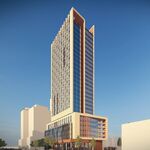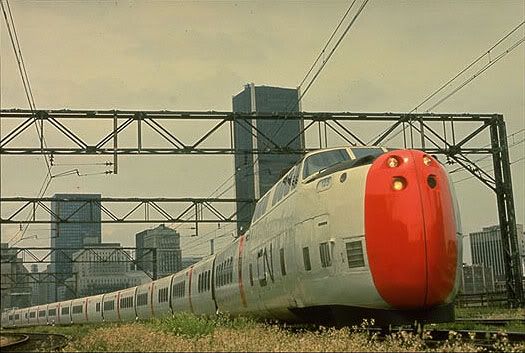A
Antiloop33rpm
Guest
Having followed urban issues in Canada quite extensively for the past 10 years I am wondering what people think of the progress that has been made in respect to issues such as public transit, public spaces, healthy cities, commercialization of our landscape, etc.
On one hand, I see that there have been some improvments made. When I lived in Ottawa I saw a transit system that slowly grew and was passable as an alternative to the car (assuming you lived within the greenbelt and within a neighborhood that predated the 60's). Toronto has seen some improvments to its system. Cities are gaining populaton in the urban areas and urban development has done well in the past decade. There are groups of citizens and political parties that do care about such issues and they have gained a respectable number of people among there ranks. So there have been some positive developments that are worth noting in the past decade.
But if you look outside of Toronto and into much of the surrounding GTA, at smaller cities such as Kitchener, Waterloo, Kingston, London, and even more starkly into smaller towns and villages, it negates any progress made rather quickly. Sprawl is still continuing at a rapid rate (evertime I am in Kingston visiting family I am amazed at how much land has been destroyed and developed since my last visit). Transit in smaller cities and villages is essentially nonexistent. Country side is continually being razed for multi acre lots with garish large homes. Wetlands are still being destroyed. Highways are still being built and expanded. Malls and now power centers and big box stores still continue to eat away at downtowns slowly adding to the count of boarded windows.
If you think about Ontario as a whole, its easy to travel across the province by car. Yet try travelling by train and your choices are limited and the service tolerable at best. If you consider energy policy, most provinces continue to look at oil, coal, and nuclear to help meet increased demand instead of reducing consumtion or looking for more sustainable sources.
I know that growth and development do come at a certain cost. But sometimes I shake my head and wonder just how intelligent we are going about it. Unfortunately I do not have any pictures yet to accompany this next observation, but I think it is one that many people will be able to relate to nonetheless. Growing up I spent an enourmous amount of time looking out the window of the family van as we travelled back and forth from Sarnia (where we lived at the time) to Kingston. In particular, the stretch of the 401 between Kingston and Toronto has been seen by myself so many times I could almost close my eyes and visual its entire length. The difference you notice driving down these stretch of highways now and 20 years ago is really quite dramatic. Where as most towns and cities along the way were barely visible from the highway, now most welcome travellers with seas of sprawl flowing to the highways edge, and in many cases, jumping across the highway and continuing to the other side. And a lot of what was just plain countryside has slowly become dotted with acre lots replacing small forests and farm land.
And this isnt even mentioning the sprawl in places like Mississauga, Oshawa, Pickering, Ajax, Whitby, Markham, the suburban feeding tube that is the 407, etc.
What bothers me most is that as soon as I leave my comfortable little urban island, the reality of what beyond it really does not seem all that encouraging. If growth continues as it is right now for even another 10 or 15 years what kind of landscape will we be looking at in the more developed regions of Ontario and Quebec?
Which leads to another question. Is this just the way its going to be? Will Canada ultimately be a suburban society with niche urbanity and continue to sprawl across the landscape? We are a democratic society and it does seem that while there are people who do care about these issues, most people, dont. And as gas prices and the cost of suburban living creep higher and higher, will we find ourselves in a situation where people simpley give up the suburban lifestyle in favour of something more sustainable and affordable, or, will the will of the people choose measures such as lowering taxes, eliminating transit funding and social services, or other measures so that they can afford to continue living the lifestyle they do?
As I said above, its not that progress is nonexistent. But, if you look at the actions of people in terms of how they vote and what policies are important to them, how they choose to conduct there life (many people might hate Wal-Mart yet how often do you here someone say that who also shops there on a weekly basis at least). The environment is important to us, but we continue to build and expand roads, destroy wetlands, and have done nothing to encourage at the very least more intelligent sprawl.
Is change actually taking place? Or is it just superficial and something that will remain important to a minority who will ultimately still have to live under a suburban rule?
On one hand, I see that there have been some improvments made. When I lived in Ottawa I saw a transit system that slowly grew and was passable as an alternative to the car (assuming you lived within the greenbelt and within a neighborhood that predated the 60's). Toronto has seen some improvments to its system. Cities are gaining populaton in the urban areas and urban development has done well in the past decade. There are groups of citizens and political parties that do care about such issues and they have gained a respectable number of people among there ranks. So there have been some positive developments that are worth noting in the past decade.
But if you look outside of Toronto and into much of the surrounding GTA, at smaller cities such as Kitchener, Waterloo, Kingston, London, and even more starkly into smaller towns and villages, it negates any progress made rather quickly. Sprawl is still continuing at a rapid rate (evertime I am in Kingston visiting family I am amazed at how much land has been destroyed and developed since my last visit). Transit in smaller cities and villages is essentially nonexistent. Country side is continually being razed for multi acre lots with garish large homes. Wetlands are still being destroyed. Highways are still being built and expanded. Malls and now power centers and big box stores still continue to eat away at downtowns slowly adding to the count of boarded windows.
If you think about Ontario as a whole, its easy to travel across the province by car. Yet try travelling by train and your choices are limited and the service tolerable at best. If you consider energy policy, most provinces continue to look at oil, coal, and nuclear to help meet increased demand instead of reducing consumtion or looking for more sustainable sources.
I know that growth and development do come at a certain cost. But sometimes I shake my head and wonder just how intelligent we are going about it. Unfortunately I do not have any pictures yet to accompany this next observation, but I think it is one that many people will be able to relate to nonetheless. Growing up I spent an enourmous amount of time looking out the window of the family van as we travelled back and forth from Sarnia (where we lived at the time) to Kingston. In particular, the stretch of the 401 between Kingston and Toronto has been seen by myself so many times I could almost close my eyes and visual its entire length. The difference you notice driving down these stretch of highways now and 20 years ago is really quite dramatic. Where as most towns and cities along the way were barely visible from the highway, now most welcome travellers with seas of sprawl flowing to the highways edge, and in many cases, jumping across the highway and continuing to the other side. And a lot of what was just plain countryside has slowly become dotted with acre lots replacing small forests and farm land.
And this isnt even mentioning the sprawl in places like Mississauga, Oshawa, Pickering, Ajax, Whitby, Markham, the suburban feeding tube that is the 407, etc.
What bothers me most is that as soon as I leave my comfortable little urban island, the reality of what beyond it really does not seem all that encouraging. If growth continues as it is right now for even another 10 or 15 years what kind of landscape will we be looking at in the more developed regions of Ontario and Quebec?
Which leads to another question. Is this just the way its going to be? Will Canada ultimately be a suburban society with niche urbanity and continue to sprawl across the landscape? We are a democratic society and it does seem that while there are people who do care about these issues, most people, dont. And as gas prices and the cost of suburban living creep higher and higher, will we find ourselves in a situation where people simpley give up the suburban lifestyle in favour of something more sustainable and affordable, or, will the will of the people choose measures such as lowering taxes, eliminating transit funding and social services, or other measures so that they can afford to continue living the lifestyle they do?
As I said above, its not that progress is nonexistent. But, if you look at the actions of people in terms of how they vote and what policies are important to them, how they choose to conduct there life (many people might hate Wal-Mart yet how often do you here someone say that who also shops there on a weekly basis at least). The environment is important to us, but we continue to build and expand roads, destroy wetlands, and have done nothing to encourage at the very least more intelligent sprawl.
Is change actually taking place? Or is it just superficial and something that will remain important to a minority who will ultimately still have to live under a suburban rule?





